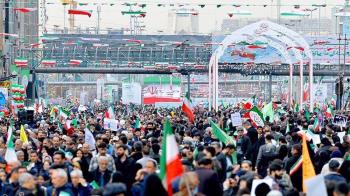Alwaght- King
Salman’s decision to make changes in the future outlook of Saudi Arabia
continues, to the extent that in the latest changes, he appointed his son as
the chairman of state-owned ARAMCO, the largest oil company in Saudi Arabia which
is also the largest petrochemical company in the world. It is noteworthy that he
was already appointed as deputy crown prince, Minister of
National Defense and Chairman of Council for Economic and Development Affairs.
As result of
new decisions, the King sacked Muqrin, his younger half-brother as crown prince
and appointed Mohammed bin Nayef as deputy crown prince, so that Mohammed bin
Salman may ascended the throne after King Salman. This decision was taken while oil prices have dropped and the costs of war, military and security forces are going up. The overall aims of these measures are to consolidate
the power of Mohammed bin Nayef as Interior Minister and Mohammed bin Salman as
Defense Minister. Billions of dollars are spent to buy opponents of the changes
in the royal family. What are the positive points of these
changes? Why should all economic cases be in
the hands of Mohammed bin Salman?
From the
Royal Court to Deputy Crown Prince
When King Salman
ascended the throne in Saudi Arabia, quickly appointed his son Muhammad the
president of the Royal Court. The King also appointed him Minister of National Defense
and Chairman of Council for Economic and Development Affairs. Thus, the King's
decisions came under control of Mohammed bin Salman through the Royal Court,
the economic agreements through the Council of Economic Affairs, and military decisions
through the Ministry of Defense. Consequently, aggression of Saudi forces on
Yemen began codenamed as “Decisive Storm”.
There is no
doubt that the war against Yemen has been a plot hatched by Mohammed bin Nayef
and Mohammed bin Salman to run the scenario of "Al-fajr al-Samet" (Silent
Dawn), especially now that the crown prince was dismissed from his
position, while this has been unprecedented in Saudi Arabia even at early sixties
in the past century when Saud and Faisal were at odds, Saud did not dismiss his
brother, the crown prince. However, it appears that King Salman has paid no
heed to Kingdom decree number A.86, issued by King Abdullah on 28 March 2015,
not to dismiss or remove the crown prince. It is clear that this paragraph would prevent the next King after
Abdullah from making changes; nevertheless, such events were not anticipated when
King Abdullah was on the throne.
However, King
Salman has also faced harsh criticism in three areas: the first: spending
billions of dollars between the ruling family to win their support and swear
allegiance to the King; the second: praising lots of
measures taken by two Mohammeds, particularly praising Mohammed
bin Salman in the media, the third: quoting the King, as he was named crown
prince on the recommendations of Mohammed bin Nayef , to the extent that there
were speculations that the King is not authorized to appoint his crown prince.
Thus, although
the Saudi aggression against Yemen failed to meet the King Salman’s
objectives, it can help Salman to put his son on the path to the kingdom and
present him as the second crown prince, so to fight Ansarullah and get back the
legitimate government of Yemen are not the slightest justification for the
intervention. But there are some questions: “when will
Muhammad ibn Salman be appointed as the first crown prince? What is the role of the recent decision in this issue? And where does Mutaib bin Abdullah stand
in these changes?
Mutaib and
the destiny of Muqrin
Implicit disputes
in Saudi family
emerged when hours after publicizing the King’s new decrees, the King along
with two Mohammeds headed to meet Muqrin, the former crown prince who is from Sudairi
tribe, and in his speech tried to pretend that he is interested in Muqrin and
has even appointed his son the consulting Minister.
Although Muqrin
incurred losses, the main problems of King Salman, Muhammad bin Nayef and
Mohammed bin Salman are concealed using a powerful man such as Mutaib bin Abdullah
in the ministry of National Guard. Despite the silent coups, Mutaib has always served as the commander of
the National Guard and as the guardian of the imperial family of Saudi Arabia
and their oil industry. As he has always protected and guarded
the capital and the holy mosques of Mecca and Medina. But what fate would befall him?
It is said
that Mutaib was forced to swear allegiance to these two Mohammeds, because he
knows that he will lose his power, if he is going to object. On
the other hand, Mohammed bin Salman seeks to gain the consent of Mutaib so that
he can win the next war with bin Nayef for being crown prince.
Undoubtedly,
Mutaib bin Abdullah will be dismissed from his position in the near future
changes, because his three brothers were dismissed upon the death of the former
King and the new King ascended the throne. It should also be acknowledged that involvement of the National Guard in
“the Decisive Storm” means that the ministry of National Guard has been
dominated by ministry of defense whose commander in chief is Muhammad ibn
Salman, in this case, the scenario outlined by “Intelligence
onLine” , a French newsletter, will be materialized. The newsletter says: "considering the expansion
of the Saudi National Guard forces along the northern and southern borders, National
Guard will be disbanded by King Salman order." It also added that "National Guard troops would
join the Royal Guard, and the troops in borders would be transferred to the
Ministry of Interior under Muhammad bin Nayef, and the rest would be transferred
to ministry of defense headed by Muhammad bin Salman", so that they will all shortly pave the way for
Mohammed bin Salman to be named crown prince.


























